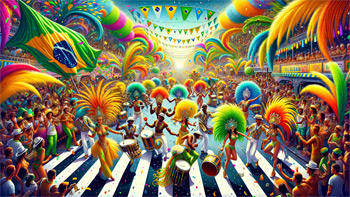 Brazilian Carnival
Brazilian Carnival


The Brazilian Carnival, a festival held annually before Lent, is one of the most vibrant and exuberant celebrations in the world. Known for its rhythmic music, colorful costumes, and lively parades, this event symbolizes the heart and soul of Brazilian culture. It is not just a party but a spectacular display of creativity, resilience, and communal spirit. The Carnival transcends beyond mere festivity; it is an integral part of Brazilian heritage, reflecting the country's diverse cultural and historical background.
The origins of the Brazilian Carnival can be traced back to the Portuguese "Entrudo," a celebration where people threw water, food, and mud at each other in a playful manner. It evolved over time, incorporating various African and Indigenous elements, especially in the rhythm and dance, leading to the creation of the modern-day Carnival. Today, the festival is a melting pot of Brazil's cultural diversity, showcasing a variety of musical styles, dances, and artistic expressions.
The Heartbeat of Carnival: Samba
At the core of the Brazilian Carnival is the samba, an Afro-Brazilian dance form that is synonymous with the festival. Samba's infectious rhythm is the heartbeat of the celebrations, with samba schools (groups that prepare for and perform in the Carnival) playing a pivotal role. These schools, which are community-based organizations, work year-round to prepare their elaborate floats, costumes, and routines for the Carnival parade, a competition where they are judged on various aspects like theme, music, and dance.
The most famous Carnival parade takes place in Rio de Janeiro at the Sambadrome, a purpose-built stadium designed for this event. Here, the samba schools showcase their spectacular performances, each telling a story through their parade, with themes ranging from historical events to cultural critiques. The energy, rhythm, and spectacle of these parades are a testament to the passion and dedication of the participants, making it a must-see event for visitors worldwide.
Carnival Across Brazil: A Tapestry of Traditions
While Rio's Carnival is the most well-known, the festival is celebrated all over Brazil, with each region adding its unique flavor to the celebration. In Salvador, Bahia, Carnival takes on a more African influence, with Afro-Brazilian music and dance taking center stage. Here, the streets come alive with "blocos afro" (Afro-Brazilian Carnival groups) and "trio elétricos" (trucks carrying live bands), creating an electrifying atmosphere.
In the northeastern city of Recife, the Carnival is known for its "frevo" music, a fast-paced and acrobatic dance form. The city, along with its neighbor Olinda, hosts a more traditional and folkloric version of the festival, featuring giant puppets parading through the streets. This region's celebration is more inclusive and less commercial, maintaining a strong connection to local traditions and community participation.
The Dazzling Costumes and Floats
An integral part of the Brazilian Carnival is the extravagant costumes and floats. Each costume and float is a work of art, rich in detail and symbolism, often reflecting the year's chosen theme for the samba school. The costumes range from the ornate and luxurious to the minimal and symbolic, with each dancer's outfit contributing to the overall visual story of the parade. The making of these costumes and floats is a significant undertaking, involving the skills and creativity of numerous artisans and designers.
The floats, especially, are a marvel of artistry and engineering. They are large, elaborate structures, often featuring moving parts and integrated special effects, designed to wow the audience and judges alike. The creativity and resourcefulness in their design and construction are a testament to the ingenuity and spirit of the Brazilian people.
The Social and Cultural Impact of Carnival
Beyond the glitz and glamor, the Brazilian Carnival has a profound social and cultural impact. It is a time when social barriers are temporarily dissolved, and people from all walks of life come together to celebrate. The festival is a platform for artistic expression and social commentary, with many samba schools using their parades to address political and social issues.
Impact on Tourism and Economy
The Brazilian Carnival is not just a cultural extravaganza but also a major economic powerhouse for Brazil. Its impact on tourism and the economy is profound and far-reaching. During the Carnival season, Brazil witnesses a significant influx of international and domestic tourists, all drawn by the allure of the festivities. This surge in visitors translates into a substantial boost for various sectors of the economy, particularly in the cities where the Carnival is celebrated most fervently.
The Brazilian Carnival is a key contributor to Brazil's economy, with its impact resonating across multiple sectors. From boosting local businesses to enhancing Brazil's global image, the Carnival is a period of both celebration and significant economic activity, underlining its importance beyond cultural expression to being a vital economic driver for the country.
In essence, the Brazilian Carnival is not just a festival but a vibrant expression of Brazil's heart and soul. It's a celebration that encapsulates the country's history, culture, and artistic creativity. From the samba parades of Rio to the frevo dances of Recife, each element of the Carnival paints a picture of a nation that is diverse, resilient, and endlessly joyful. Whether you're experiencing it in person or through images and stories, the Brazilian Carnival is a phenomenon that captures the essence of Brazil's spirited way of life.